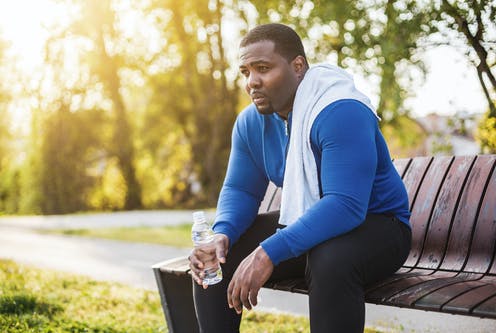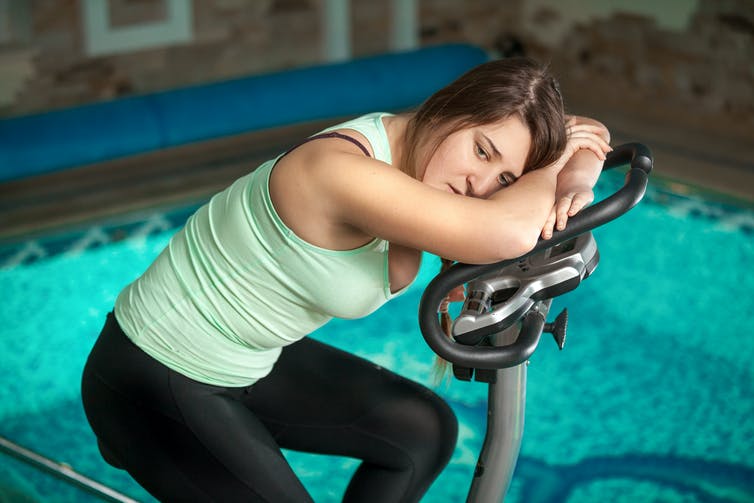
When it comes to improving our physical fitness, the time you don’t spend exercising (often known as “recovery”) is as important as the exercise and training you do.
Not only is recovery important for anyone who wants to build muscle mass, taking enough time to recover between training sessions is also important for avoiding “overtraining” – a form of extreme fatigue where recovery can take weeks to years to occur.
Overtraining happens when there’s an imbalance between the amount of exercise you do and the amount of recovery you have between sessions. It can cause an impaired immune response, altered hormonal activity and persistent fatigue (often lasting for more than four weeks). But some reports and comments online also suggest that overtraining might be a reason why some people are struggling to lose weight – or may even be causing them to gain weight. This is unlikely to be the case – here’s why.
To lose weight, you must create what’s known as a “calorie deficit”. This essentially just means burning more calories than you’re taking in, and over a sustained period of time.
There are two ways to achieve a calorie deficit – whether that’s changing your diet so you’re eating fewer calories than your body burns, or increasing the amount of exercise you do so you’re burning more calories than you’re taking in.
On this basis, it would seem realistic to expect that if someone is overtraining then they’d probably be burning more calories than they’re taking in – leading to weight loss. But some people believe that because exercise stresses the body, overtraining would therefore cause long-term stress to the body – subsequently leading to weight gain. This counterintuitive link normally involves a hormone called cortisol.
The hormone cortisol is usually released in response to stress – such as from mental stress due to work or school. Cortisol is also released when we complete moderate or intense exercise stress. The body does this in order to help prepare for the stress it will experience – so it tells the body to release some energy to help to complete whatever exercise we’re doing.
Increases in cortisol levels from exercise-related stress are typically short-lived and usually return to normal within an hour after exercise. Anyone who frequently trains at a high level will therefore repeatedly experience elevated cortisol levels due to exercise-related stress.
Stress and weight
Overexposure to cortisol leads to an increase in the activation of a particular enzyme called lipoprotein lipase that exists in fat cells. This enzyme tells cells to increase their storage of fats and explains why excess stress can sometimes lead to an increase in fat in the abdomen area, face and chest. Excessive cortisol levels can also make it easier for fat tissue to regenerate cortisol in the fat tissue itself – further increasing the activity of lipoprotein lipase and subsequent fat storage.
There’s some evidence that the group of glands that make cortisol (known as the HPA axis) are affected by overtraining. But much of this research shows that the response of cortisol to stress actually decreases during a period of overtraining.

kryzhov/ Shutterstock
Work from my own laboratory found that the cortisol response to a high-intensity, 30-minute cycle exercise stress test is lowered following a short period (11 days) of intensified exercise. This, alongside findings from other research, suggests that during periods of overtraining cortisol concentrations in our blood may actually be decreased in response to a stressful event – such as exercise.
This may be a protective mechanism for the body when it is repeatedly exposed to increased cortisol levels. It means that it’s unlikely a period of overtraining will increase fat storage and weight gain.
Prevalence of overtraining
Even if you exercise regularly, it’s really hard to know what your risk may be of overtraining. We do know that high-level athletes are more likely to suffer from overtraining due to their intense training demands, with studies showing between 30% and 60% of athletes experience overtraining. But research looking specifically at how often the average person experiences overtraining is scarce.
So why might people be experiencing a weight loss plateau even if they’re exercising often? While the hormone cortisol is linked with weight gain, it’s unlikely that the average person who exercises a few times a week is going to stress their body enough to cause the kind of significant and sustained cortisol spike needed to do this.
The reason people might be experiencing a weight loss plateau – or even weight gain – despite going to the gym a few times a week or even daily can be due to any number of factors. Excess stress in your day-to-day might be one cause, alongside poor diet, not being in a calorie deficit or even overestimating the number of calories you’re burning in the gym.
If you’ve already succeeded in losing some weight but find that your progress has stalled, it may be worth calculating whether you now require fewer calories. Adding in some additional light activity everyday – such as a lunchtime walk – might also help you burn some additional calories without stressing your body.
While it’s unlikely that overtraining is preventing the average person from losing weight, it’s always important to schedule rest days into your exercise routine to avoid fatigue and allow your muscles to recover.
![]()
John Hough does not work for, consult, own shares in or receive funding from any company or organisation that would benefit from this article, and has disclosed no relevant affiliations beyond their academic appointment.
























